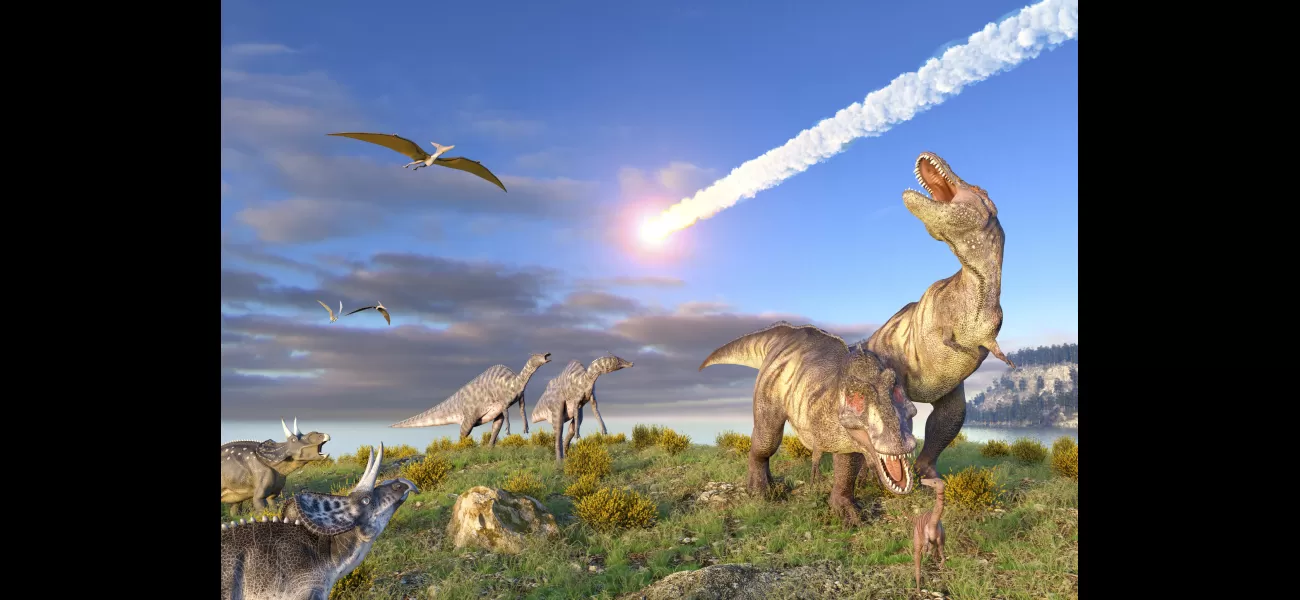Dinosaurs were in trouble before the asteroid hit.
Apologies, gentlemen.
January 15th 2024.

The age-old question of whether a massive asteroid was the sole cause of the dinosaurs' extinction has been a topic of debate for years. However, a recent study has shed new light on the subject, suggesting that the dinosaurs were already on their way out when the asteroid hit Earth 66 million years ago.
While the asteroid's impact was undoubtedly devastating, researchers now believe that volcanic eruptions also played a significant role in the dinosaurs' downfall. These eruptions caused what is known as a "volcanic winter," which resulted in plummeting temperatures and widespread starvation.
The asteroid, estimated to be between six and ten miles wide and traveling at a staggering 20 kilometers per second, caused massive destruction upon impact. It created a crater over a hundred miles wide and taller than the Himalayas. The debris and dust thrown into the air blocked out the sun's rays, preventing plants from growing and causing widespread famine.
But the latest research has uncovered evidence that volcanic eruptions, occurring 200,000 years before the asteroid strike, may have triggered a similar phenomenon. Using a new technique that involves analyzing rock samples, scientists were able to determine the amount of sulphur and fluorine released into the atmosphere by these eruptions.
The results were astonishing, with the sulphur release alone potentially causing a drop in global temperatures, leading to a "volcanic winter." This would have weakened the dinosaurs' grip and "set the stage" for their eventual extinction by the asteroid later on.
The study also suggests that the asteroid impact was just one piece of the puzzle in the dinosaurs' extinction. By delving into the history of volcanic eruptions in the Deccan Traps in India, the researchers uncovered evidence that these eruptions may have played a crucial role in cooling the Earth's climate around 65 million years ago.
The team's groundbreaking work took them all around the world, from collecting rocks in the Deccan Traps to analyzing them in England and Sweden. They even developed a new technique, similar to cooking pasta, to decode the volcanic history of the rocks.
This innovative technique allowed them to calculate the amount of sulphur and fluorine released during the ancient eruptions, providing valuable insights into Earth's past. The researchers hope that their findings will not only help us better understand the extinction of the dinosaurs but also provide valuable information for our own changing climate.
As we continue to uncover Earth's ancient secrets, the search for missing pieces of the puzzle will undoubtedly lead to more groundbreaking discoveries. And perhaps, with a better understanding of our planet's past, we can pave the way for a more informed approach to our future.
While the asteroid's impact was undoubtedly devastating, researchers now believe that volcanic eruptions also played a significant role in the dinosaurs' downfall. These eruptions caused what is known as a "volcanic winter," which resulted in plummeting temperatures and widespread starvation.
The asteroid, estimated to be between six and ten miles wide and traveling at a staggering 20 kilometers per second, caused massive destruction upon impact. It created a crater over a hundred miles wide and taller than the Himalayas. The debris and dust thrown into the air blocked out the sun's rays, preventing plants from growing and causing widespread famine.
But the latest research has uncovered evidence that volcanic eruptions, occurring 200,000 years before the asteroid strike, may have triggered a similar phenomenon. Using a new technique that involves analyzing rock samples, scientists were able to determine the amount of sulphur and fluorine released into the atmosphere by these eruptions.
The results were astonishing, with the sulphur release alone potentially causing a drop in global temperatures, leading to a "volcanic winter." This would have weakened the dinosaurs' grip and "set the stage" for their eventual extinction by the asteroid later on.
The study also suggests that the asteroid impact was just one piece of the puzzle in the dinosaurs' extinction. By delving into the history of volcanic eruptions in the Deccan Traps in India, the researchers uncovered evidence that these eruptions may have played a crucial role in cooling the Earth's climate around 65 million years ago.
The team's groundbreaking work took them all around the world, from collecting rocks in the Deccan Traps to analyzing them in England and Sweden. They even developed a new technique, similar to cooking pasta, to decode the volcanic history of the rocks.
This innovative technique allowed them to calculate the amount of sulphur and fluorine released during the ancient eruptions, providing valuable insights into Earth's past. The researchers hope that their findings will not only help us better understand the extinction of the dinosaurs but also provide valuable information for our own changing climate.
As we continue to uncover Earth's ancient secrets, the search for missing pieces of the puzzle will undoubtedly lead to more groundbreaking discoveries. And perhaps, with a better understanding of our planet's past, we can pave the way for a more informed approach to our future.
[This article has been trending online recently and has been generated with AI. Your feed is customized.]
[Generative AI is experimental.]
0
0
Submit Comment





